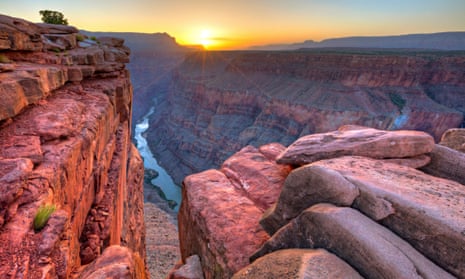The US House of Representatives has passed a historic public lands preservation bill that pledges to protect nearly 3m acres of federal lands in Colorado, California, Washington and Arizona.
The act combines various bills that languished without Senate approval during the Trump administration. Key provisions include permanently banning new uranium mining on land surrounding the Grand Canyon, giving wilderness designation to 1.5m acres of federal land, and preserving 1,000 river miles by adding them to the Wild and Scenic Rivers System.
“This is one of the largest public lands protection bills to ever go before Congress,” said Kristen Brengel, senior vice-president of government affairs for the National Parks Conservation Association. “Wilderness designation is the strongest protection there is to ensure the lands will never be developed. And it can’t be undone with the stroke of pen.”
The bill, called the Protecting America’s Wilderness and Public Lands Act, has strong support from the Biden administration, in part because it will help the president achieve his goal of protecting at least 30% of US land from development by 2030 in order to combat climate change.
Still, the bill must first pass a divided Senate. Given partisan opposition to the measure from some Republican senators, approval could come down to Vice-President Kamala Harris casting a tie-breaking vote.
Sponsored by the Colorado representative Diana DeGette, the bill passed the House in a 227 to 200 vote, generally along party lines. During debate on Thursday, Republican congressional representatives opposing the act argued that it would, among other things, inhibit firefighting abilities in areas close to or surrounded by wilderness in California and Colorado, and create additional burdens for land managers.
“This bill won’t help the environment but will instead kill jobs and imperil our national security and American energy dependence,” said the Arkansas congressman Bruce Westerman, the highest-ranking Republican member on the House natural resources committee.
The package of eight individually sponsored bills incorporated into the Act include:
Arizona
The Grand Canyon Protection Act would provide a victory in the decades-long battle fought by the Havasupai tribe, who live at the bottom of the Grand Canyon, to protect their drinking water from uranium mining contamination. The bill permanently withdraws more than 1m federally owned acres north and south of Grand Canyon from eligibility for new mining claims.
“Grand Canyon is the homeland of indigenous peoples, a primary driver of Arizona’s outdoor recreation and tourism-fueled economy, and a worldwide wonder,” said Amber Reimondo, energy director for the Grand Canyon Trust. “The risks of uranium extraction are not worth it now and never will be. We look forward to the Grand Canyon Protection Act becoming law.”
California
Four different bills significantly enhance public lands recreation opportunities in the Golden state. A new 400-mile trail along the central coast would connect northern and southern wilderness areas in the Los Padres national Forest. In north-west California, a total of 306,500 acres would be protected through wilderness designation. In southern California, popular recreation areas in the Santa Monica mountains and San Gabriel mountains would be significantly expanded and protected from development.
Colorado
Initially introduced by DeGette more than a decade ago, a Colorado measure will add 660,000 acres of public land to the National Wilderness Preservation System. While many of Colorado’s towering mountain peaks are already designated wilderness, the new bill specifically protects lower-elevation areas that are popular for recreation and critical wildlife habitat. Like all lands in the wilderness system, the areas will be off limits to motorized vehicles and resource extraction. An additional measure provides protection to 400,000 acres of federal land through wilderness designation and limiting oil and gas development.
Washington
This bill seeks to expand designated wilderness on Washington’s Olympic Peninsula and adds 460 river miles to the National Wild and Scenic Rivers System.
